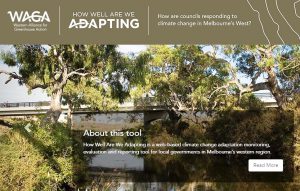
A group of councils in metropolitan Melbourne has collaborated to develop a framework that tracks their progress on climate change, writes Dr Susie Moloney.
Local governments are often at the forefront of responding to climate change in developing risk assessments and mitigation and adaptation strategies.

They play a critical role in the process of planning for climate change and enabling their communities to adapt and thrive.
In Australia, local government plans and strategies are emerging but the extent to which municipalities are planning effectively and delivering on outcomes is difficult to assess.
While there are a number of frameworks for monitoring, evaluating and reporting climate change adaptation and resilience, very few have been implemented at the local scale.
Pioneering Melbourne collaboration
A group of councils in metropolitan Melbourne – the Western Alliance for Greenhouse Action, or WAGA – has collaborated to develop a framework to track how well they are adapting to climate change and to improve their resilience.
The project funded from 2014-2017 included the development of the online portal How Well Are We Adapting which is currently being used by a number of councils in Melbourne’s west.
The group was responding to a recognised need to track progress on adaptation plans and actions and have demonstrated significant leadership in creating this framework and online tool, which they hope other councils may adopt.
The framework was created collaboratively in response to international experience and by engaging a range of council stakeholders across different departments.
It includes regional baseline indicators, climate variables, regional vulnerability or resilience indicators and priority themes relevant to council service delivery.
These themes include:
- community wellbeing and emergency management
- open space and water security
- assets and infrastructure, and
- planning, building and regulation.
The project focused on developing indicators for the first two themes with the other two currently a work in progress.
Each theme includes four components:
- service vulnerability or resilience
- institutional capacity
- resourcing and budgets, and
- participation and awareness.
Challenges identified
The project highlighted that there were resourcing constraints for council officers given their pre-existing work commitments and insufficient work-planning. This was related to a lack of managerial support in some councils with other priorities seen to be more important.

There was also longer than expected timeframes involved in effectively engaging with internal council stakeholders, particularly from non-sustainability teams who may not be familiar with climate change or where it is not central to their work.
The project also highlighted that an organisation’s capacity to commit to a process of data collection, monitoring, evaluation, learning and review requires political and senior management support and necessary resourcing.
Benefits of the approach
Participant councils recognised the value in using the framework and the indicators to inform decision making and improve processes around climate change adaptation.
The councils were also able to thoroughly embed adaptation into their activities and found that data engaged senior managers by taking climate change adaptation from an abstract issue with ill-defined effects on service delivery to a tangible issue that directly impacted their work.
The framework can also be used to monitor governance and compliance for adaptation against internal strategies and assist with state government legislative requirements.
It also provides a platform to compare differences and identify what is working and what needs to be improved, and gives council staff a sense of ownership as something that has been designed by them and for their decision making.
The co-production process involved in the project increased recognition of the need to adapt to climate change, and contributed to capacity building among council staff, particularly recognition of how climate change impacts affects their roles and responsibilities in local government.
It also enables staff to shift their perspective toward longer term timeframes for decision making and a realisation there may be conflicting adaptation goals or trade-offs around potential solutions at local and regional scales.
Staff also recognised the importance of progress rather than perfection when learning to respond and adapt to climate change impacts and that the framework could be a useful tool to inform the learning process.
Dr Susie Moloney is a senior lecturer in the School of Global Urban and Social Studies at RMIT University. She has written about the Melbourne collaboration for a chapter in the new book Resilience-Oriented Urban Planning.
